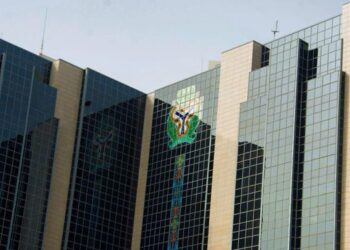The Central Bank of Nigeria’s (CBN) Governor, Mr. Godwin Emefiele has finally unveiled the 5-year policy direction for the apex bank. While reading the policy document for the CBN to cover the next five years (2019-2024) on Monday, Mr. Emefiele disclosed that the apex bank is targetting a double-digit growth for the Nigerian economy.
Similarly, the Central Bank Governor stated that in the next five years, Nigeria’s inflation rate will drop to a low single-digit and become stable.
The fragility of Nigeria’s economy: While highlighting some successes recorded in the past five years (2014-2019), the Central Bank Governor stated that although the results recorded in the last five years of his administrations are re-assuring, Nigeria’s economy still remains fragile.
“While these results are reassuring, I think it is fair to state that our task of building a stronger economy is far from complete. The pace of GDP growth remains fragile and is below the growth of our annual population growth rate of 2.7%.”
“The recovery of our economy from the recession has not resulted in a significant reduction in our unemployment rate. We are yet to see a substantial increase in credit to the private sector by our financial institution.”

Some external factors: Speaking further, Emefiele highlighted global factors that may slow down Nigeria’s economy. According to the Central Bank Governor, beyond the domestic challenges of unemployment and subdued growth, the economy is still faced with three external events that have the ability to affect the country’s growth trajectory. The Central Bank’s Governor explained three key factors that include the following:
1. Rising trade tension between the United States and China, United States and Mexico, and subdued trade in the eurozone, as well as other emerging economies such as China, India, South Africa, Brazil, Argentina and Turkey, are affecting global outlook for 2019 and 2020.
2. The rising trade tension and the potential slowdown in growth in advance and emerging economies is the impact it could have on capital flow to emerging markets.
The risk of sudden stop and reversal of capital flows has increased as some investors weighed the benefits of investing in fixed assets in the advanced economy relative to assets in emerging markets.
3. Rising volatilities in the crude oil markets occasioned by the rapid increase in the supply of shale oil by the United State. The rise in U.S production continues to put on downward pressure on crude oil prices despite restrictions on crude oil output by the OPEC members and sanctions by the U.S on the purchase of Iranian crude oil and Venezuela.
[Also Read: Critical times for Nigeria’s oil money as US-China trade war escalates]
The CBN’s 5-years Plan: The Central Bank Governor rolled out a 5-point agenda that the Bank will pursue in the next five years to manage the Nigerian economy. The CBN Governor disclosed;
Fellow Nigerians, few weeks ago, we held consultations with some banks and business leaders in the private sectors. We thank them immensely for their thought-provoking ideas and counsel.
We intend to sustain the pace of those consultations as these would act as barometer that are for measuring the progress being made in the implementation of our policies.
Consequently, working closely with our fiscal authorities, we pledge to target a double-digit growth by the next five years, and at the CBN, we commit to working assiduously to bringing down inflation to single digit while accelerating the rate of employment.
The Five points agenda:
- Domestic macroeconomic and financial stability
- Foster the development of a robust financial payment system infrastructure that will increase access to finance to all Nigerians, thereby raising the financial inclusion rate in the country.
- Continue to work with DMBs to improve access to credit for not only smallholder farmers and MSMEs but also the consumer credit and mortgage facilities for bank to bank customers.
- Extend intervention support to the teeming youth population who possess entrepreneurial skills in the creative industry.
- Also, the intervention includes encouraging deposit money banks to direct more focus on supporting the educational sector.
4. Grow external reserves
5. Support efforts at diversifying the economy through intervention programmes in the agricultural and manufacturing sectors.



















You can a double growth next year and this for the part of fed govt if,they can plug this leakage in the economy.the fed govt must ask themselves why did the recession happen, a recession does not happen in vacuum.THERE ARE SIGNS IT WILL HAPPEN,AND THE GOVT STARTED STARTED THIS BLAME GAME.BLAMES PREVIOUS GOVT OR BLAME GEJ.
Secondly all programme started by govt and the cbn,if they gives more power to their programme,it will work using stats working in-cooperation with all local govt area.if they integrates then on the basis “DO WHAT I TAKES TO DO THE JOB ” and I think the particular and relevant national govt officials in charge knows,what I am talking.and why Nigerian lga in rural area are not sharing in the national cake,by national cake,i means why towns are not having the same economic activities as the rural areas
A RECESSION STARTS WITH THE WEAKNESS OF THE HUMAN SPIRIT.I.E (1) CONSUMERS (2)BUSINESS MEN/ENTEPRENUERS (3)GOVT OFFICIAL apart from the human angle you have the next main issue OPERATIONAL AND SYSTEMATIC FAILURE,I.E,the present operation system is already weak and,secondly the present operation system is out-of-date,and it is not serving it’s purposes